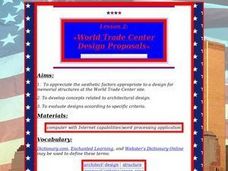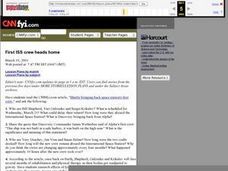Curated OER
Headlines
Students analyze how newspapers report the news and compare the events that they now know about World War II as compared to what was publicized back then.
Curated OER
The Whole World is Watching: Iran, 2009
Students study the impact of social media. In this Iranian election lesson, students examine the outcome of the 2009 election and the public protests that followed it. Students determine how citizen journalism informed people around the...
MEP: Demonstration Project
Unit 5 Probability Activities
Wow! Here is a 14-page package of activities to use when your math class is studying probability. There are a myriad of pertinent experiments for learners to try, such as rolling a self-constructed multi-faced three-dimensional...
Curated OER
Cloud in the Classroom
Students describe the relationship between animals and humans. In this biology lesson, students research about the history of horses in America. They present a mock news broadcast about their research.
Curated OER
Messages in Art Work
Observe images and discuss what messages they convey. In this critical thinking lesson plan, students determine whether works of art are trying to persuade their audience. They also consider the media and how they communicate messages to...
Curated OER
Rhythm & Improv: Jazz & Poetry
Students analyze the elements of poetry and jazz. In this critical thinking skills lesson, students take a closer look at the rhyme, rhythm, alliteration, form, free verse, lyricism, and imagery that exist is jazz as well as poetry.
Curated OER
Citizens Together
Students examine the bill of rights as it relates to founding documents and their significance today. In this bill of rights lesson plan, students use newspapers as sources to answer critical questions regarding democratic citizenship....
Curated OER
World Trade Center Design Proposals
Students explore architectural design. In this critical thinking and architecture instructional activity, students view a number of websites providing proposals for design plans of a new World Trade Center. Students choose...
Curated OER
Dealing With Death
Students watch and analyze a video dealing with the topic of death. They answer discussion questions, identify examples of how death is represented in popular media, write a poem, create a memory book, and write a letter to someone who...
Curated OER
Investigative Journalism
Students choose newsworthy topics to research and investigate, narrow focus of investigation, get information from the source through interviews, write stories, and submit to media outlets.
Curated OER
First Things First: Using the Newspaper to Teach the Freedoms of the First Amendment
Students use the newspaper as a tool to make connections about what the five freedoms guarantee in the First Amendment. For this first amendment lesson plan, students analyze events in the newspaper to form conclusions about the freedoms...
Curated OER
First ISS Crew Heads Home
Young scholars read an article on the first crew of the international space station and answer a series of critical thinking questions.
Curated OER
Urban Renewal
Eleventh graders write down their best guess at the meaning of "urban renewal." students stage a Mayor's press conference announcing a new urban development plan for the Fillmore.
Curated OER
Analysis of Newspaper Articles
Students investigate journalism by researching a list of articles. In this story analysis instructional activity, students read several current event articles and answer a list of study questions as a group. Students summarize the...
PBS
Facts vs. Opinions vs. Informed Opinions and their Role in Journalism
Do reporters write about what they see, or what they think? Examine the differences between investigative writing and opinion writing with a instructional activity from PBS. Learners look over different examples of each kind of...
Messenger Education
Give Me a Boost—How Gravity Assists Aid Space Exploration
The propellant needed for space explorations runs in the thousands, while paying to get the craft into orbit costs millions! In the second installment of three, two activities explore laws of conservation of energy and momentum. Using...
The New York Times
Decision Point: Understanding the U.S.’s Dilemma Over North Korea
Simulate the Situation Room and analyze the US's relationship with North Korea. The plan starts off with a quick review and an examination of a online timeline that updates as the situation continues. Next, the class reads an article and...
University of Pennsylvania
Using Comic Strips to Teach Multiple Perspectives
Scholars view comics from two different perspectives; one paints the Alfred Dreyfus as innocent, while the other portrays the exact opposite. They solve the mystery of what happened by analyzing the source, working in groups, and...
Newseum
Slanted Facts and Slippery Numbers
The Internet is known as the information superhighway, but sometimes it's hard to know when to hit the brakes on unreliable sources. Using a well-rounded lesson plan, pupils read and summarize articles about the gender pay gap and...
Curated OER
Writing Reports
Students critically examine the features of reports aimed at a young audience. Students discuss characteristics of a good report (who, what, where, when, why, how). They write their own report and include these characteristics in their...
Curated OER
Study of an Underwater Voyage
Young scholars examine the experiment of Lloyd Godson who lived 13 days underwater. In this critical thinking lesson, students predict, study and discuss various aspects of the underwater voyage. The lesson includes many cross-curricular...
Curated OER
Objective Versus Subjective
Students examine the difference between subjective and objective statements, newscasts, and media. They discover that subjective is opinion based and objective is fact based.
Curated OER
Becoming familiar with National Public Radio
Students listen to a National Public Radio program. They summarize the program, and write a script from a controversial newspaper article that could be a part of the NPR program they listened to.
Curated OER
Stereotypes: More Than Meets the Eye
Pupils explore the concept of stereotyping. They observe images and media that portray the Middle East and its inhabitants. Students make determinations about the impact of the images on their perceptions. They consider ways to...

























